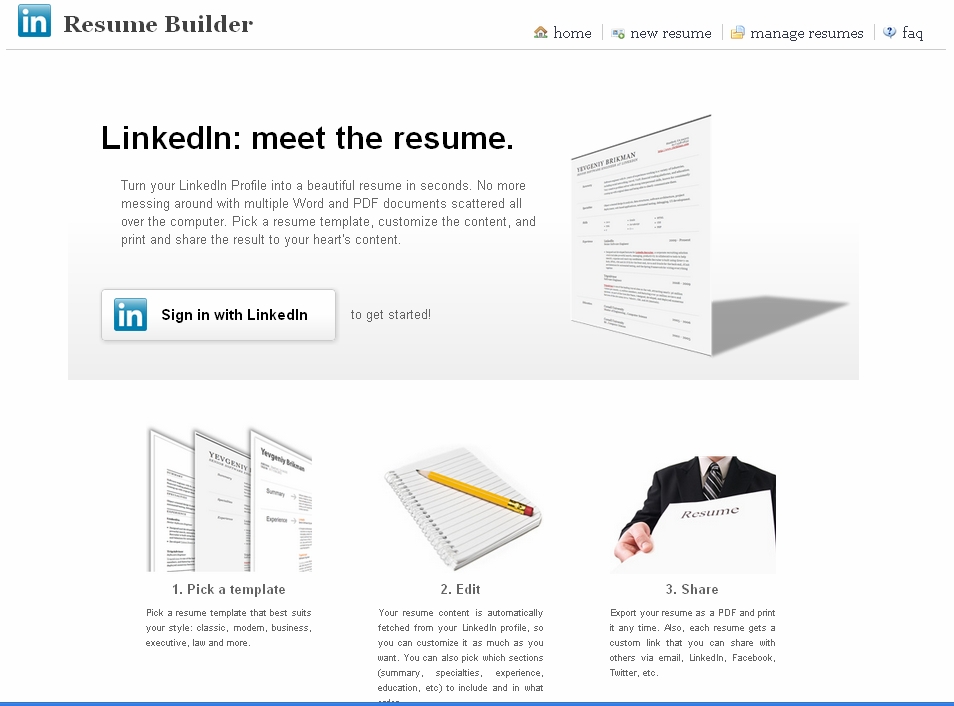 LinkedIn introduced a resume building tool a while ago that, even though it’s slick, simple to use, and creates attractive resumes, would be otherwise unremarkable.
LinkedIn introduced a resume building tool a while ago that, even though it’s slick, simple to use, and creates attractive resumes, would be otherwise unremarkable.
Except that it’s LinkedIn offering it. And it’s a step better than what Monster and CareerBuilder offer. And, more to the point, it’s another step in the LinkedIn transformation from a business-oriented social network to … something else, like a job board for the 21st century.
The LinkedIn people don’t necessarily agree with that. Francois Dufour, senior director of marketing, LinkedIn Hiring Solutions, wrote to tell me that “LinkedIn is a professional network.” It’s “a platform for helping professionals manage their careers.”
“Whether you’re looking to hire or be hired, LinkedIn is becoming top of mind for a lot of people,” Dufour says in his response to my email about what LinkedIn is becoming. “Yet the reason we continue to thrive is that we offer so much more than a job board.”
True enough. Being public, a profile is a marketing and brand-building tool. Participating in groups and building a network furthers those objectives, as well as gives participants a place to get help with professional problems.
Traditional job boards have their discussion groups, but nothing even remotely approaching what LinkedIn has. Yet with what we’ve been seeing from LinkedIn over the years, the camel’s nose is getting further and further into the job board tent.
Recruiters began sifting through the profiles years ago. So adding LinkedIn Jobs in 2005 was, as Jeff Clavier described it a “natural extension.” Since then, the network has refined its candidate sourcing tools, improved the targeting of its jobs listings, added company profiles in what might fairly be described as a response to Facebook and, in the last two months, LinkedIn has added Jobs For You and Referral Engine (which we wrote about last month).
Along now comes Resume Builder. Technically still in the experimental stage and without a release date (though it is fully usable), it’s another natural extension of LinkedIn. From what Dufour says, LinkedIn agrees. “We want the LinkedIn profile to be the professional profile of record, whatever the context – personal and professional brand-building,” Dufour writes in his email.
He rightly points out that, “We are a leading source of quality candidates for corporations…” Indeed the public nature of most of the profiles provides a higher degree of confidence in their accuracy than do the private resumes of a job board. And because of the value the professional groups and contacts offer, the sheer number of participants — 85 million a month ago — is well beyond what any of the job boards has.
So Resume Builder — did I mention how cool it is? — is a good thing, right?
Not necessarily, says Gerry Crispin. Partner in the recruitment consultancy CareerXroads, he told my colleague Amybeth Hale that LinkedIn could end up rebranding itself as “the new job board of the 21st century.”
Should that happen, he told her, then professionals who want the business connections, but don’t want to be thought of as job-seeking, will go elsewhere.
“You want to find people who are actively engaged in work,” Crispin pointed out. “What you find out about them is that they’re looking to improve their capability on the job. It (makes) them great for recruiting. But if LinkedIn focuses solely on the recruiting aspect, it will drive those other people (non-actives) underground.”
There’s a thin line there that LinkedIn is walking. It’s adopting some of the best of what the job boards have to offer, and has so far done it successfully. But, as Crispin observes, it faces a risk if it becomes thought of primarily as a job-search site.
LinkedIn’s Resume Builder doesn’t tip that scale. The difference between resume builders on job boards and on LinkedIn are all about their reason for being. You use a resume builder on a job board for job hunting.
The LinkedIn tool is a convenience. It takes the profile you already have and turns into a resume.
It may be a subtle difference, but it is a difference that recognizes all of us (OK, most all of us) are passive one day, receptive another, and active the fourth Friday in a row that the boss drops a project on you that absolutely, positively, has to be done for the meeting on Monday.